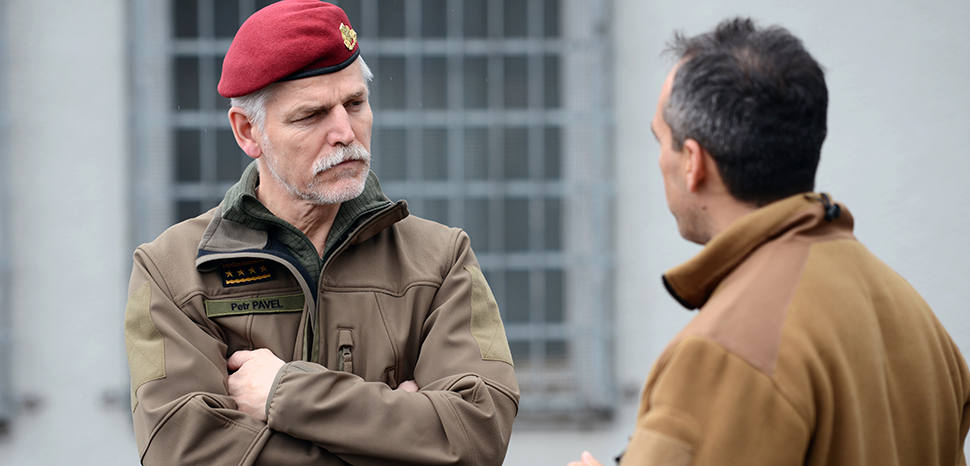Alexander Brotman

As European Commission President Ursula von der Leyen led a summit with Ukrainian President Zelenskyy again in Kyiv this past week, new urgency in the rhetoric regarding Ukraine’s Euro-Atlantic aspirations started to emerge. Building on the neo-idealism of Central and Eastern European (CEE) states that scholar Benjamin Tallis has written so eloquently about, the new Czech President Petr Pavel was quick to express his firm conviction that Ukraine belongs in NATO and that there is no alternative. In addition, Pavel’s call to Taiwanese President Tsai Ing-wen in which he insisted that ‘China is not compatible with Western democracies’ also spoke to the pragmatic approach of the CEE states and of the confidence that their newfound position in Europe has afforded them. This contrasts markedly with Germany, in which a major stake in the port of Hamburg is due to be sold to a Chinese conglomerate, and the sale of Frankfurt Hahn airport to a Russian investor has also been approved. Thus, the power of small states to determine Europe’s values idealistically yet pragmatically is a major source of divergence between the EU’s older and more traditional power brokers and the EU’s formerly peripheral states.
Poland and the Baltic states have held a similar view regarding Ukraine’s NATO ambitions for most of the recent conflict’s duration, and former British prime minister Boris Johnson also now believes Ukraine should be admitted to NATO ‘as soon as possible.’ Driven by the historical memories of Soviet occupation or alignment and bearing the fruit of Western prosperity for several decades now, NATO enlargement is no longer a US-led, civilising endeavour under the guise of hegemony at the end of the Cold War. Instead, it has become homegrown and tactically advantageous to the European heartland, not to latch onto the benefits of the unipolar moment, but to decisively stand for a rules-based, democratic order threatened by both established and rising illiberal forces, namely Russia and China. This is not to say that the CEE states don’t have illiberal forces themselves, and in fact most have underlying weaknesses that still have to be addressed. Just as Pavel was elected in the Czech Republic, Hungary ousted hundreds of senior military leaders in an act which critics of President Orban have deemed to be politically-motivated. While the true rationale remains to be seen, it is possible this marks another step on Hungary’s long march away from democracy and towards a hybrid regime bordering on autocracy within the EU.
The one way in which the CEE states’ adamant approach towards Ukraine may backfire is with Turkey, NATO’s most ideologically unaligned state that still holds tremendous power as seen in talks over Finland and Sweden’s NATO accession. While Turkey has less of a claim to Europe and to the historical memory that guides the approach of the CEE region towards Ukraine’s security interests, it is powerful enough to significantly hamper Kyiv’s Euro-Atlantic trajectory. The upcoming NATO Summit in Vilnius in June will be critical to both ratifying Finland and Sweden’s accession, while producing more forceful commitments to Ukraine than was originally outlined in the 2008 Bucharest Summit. The Baltic and CEE states will likely push for a strict timeline rather than empty promises, knowing Ukraine cannot afford to wait another decade in the geopolitical wilderness as a pawn on the chessboard of other nations’ ambitions.
Over the course of the almost year-long conflict in Ukraine, the CEE states have successfully matched Europe’s values with its realistic ambitions in dealing with their neighbour Ukraine. Given another large-scale Russian offensive is likely over the next weeks or month, now is the time to formalise those values and commit to Kyiv’s future within the European political and security system. In resisting not just Russia but China as well, the forceful yet values-driven approach of CEE states like the Czech Republic, rather than Germany and France, are important tools in NATO’s arsenal. These states also help to dispel the myth that NATO enlargement and the actions of the US after the fall of the Soviet Union caused a revanchist Russia to return under the neo-imperial mindset of Vladimir Putin. Watching his post in Dresden be ransacked and having no one on the other end of the phone in Moscow to answer his call for help likely planted the seeds of Putin’s disdain years before he assumed power. As Putin and other nationalist-minded leaders within the EU reveal, there will always be members of society yearning for a return to the past and a simpler dichotomy in which to view the world. What the CEE states have mastered is a sense of nostalgic fortitude, re-imagining old alliances for new purposes and translating the principles of liberation and self-determination to serve a higher pan-European framework.
As Ukraine war reaches the one-year mark, Europe’s periphery is informing and influencing its core in ways that seem irreversible if the bloc is set to continue as a forceful geopolitical actor in a multipolar world. Europe is at its best not just when the Franco-German axis is working harmoniously, but when the dynamism of smaller and newer member states accelerates developments that the core would previously have never dreamed of pursuing. Ukraine’s future as a decisively European state is one of those developments, and the changing rhetoric from Europe is grounds for optimism even as Russia’s war of aggression shows no signs of abating along the Donbas front.
No comments:
Post a Comment